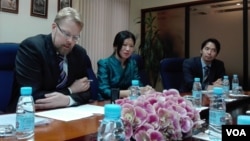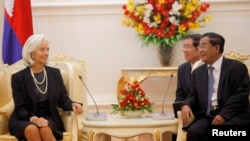Cambodia’s economy is expected to grow by 7 percent in 2017 and 2018 despite disruptions due to “election-related uncertainty”, according to the International Monetary Fund (IMF).
Speaking to journalists on Tuesday, the IMF said it expected Cambodia’s economic growth to remain steady thanks in large part to booming construction and tourism sectors.
“Cambodia continues to grow at an impressive pace,” said Jarkko Turunen, IMF’s deputy division chief for the Asia Pacific. “Economic activity remained strong in 2016, while inflation rose to 3 percent, driven by higher food and energy prices.”
“Cambodia’s economic outlook is positive, although there are downside risks,” he added.
On July 29, the Cambodian People’s Party will seek to maintain its more than 30-year rule in a general election after suffering significant losses at local elections in June.
Prime Minister Hun Sen has repeatedly issued threats that “civil war” could break out if the CPP loses the election to the Cambodia National Rescue Party.
“We see some decline in private investment related to the election-related uncertainties,” Turunen said, adding that such declines have been offset by higher public spending and strong growth in the construction and tourism sectors.
Private investment is forecasted to be “much weaker” in the election season said Miguel Chanco, a lead Asean analyst at the Economist Intelligence Unit (EIU).
“Indeed, we expect many prospective investors to take a wait and see approach, with businesses hoping to see a clean election and a smooth transition in power, if necessary. All the signs since mid-2015, however, point the other way,” Chanco said.
The IMF also said that new tax collection strategies had seen revenue rise by almost a third to about $1.2 billion in the first six months of the year. However, it said that unless tax collection was “reinvigorated” public spending demands would not be met.
“I would agree with the IMF that the country needs more reforms in the areas it mentioned, but I would like to emphasize a few areas -- human capital, rule of law, and transparency -- where there haven't been any significant improvements in recent years,” Chanco said.





